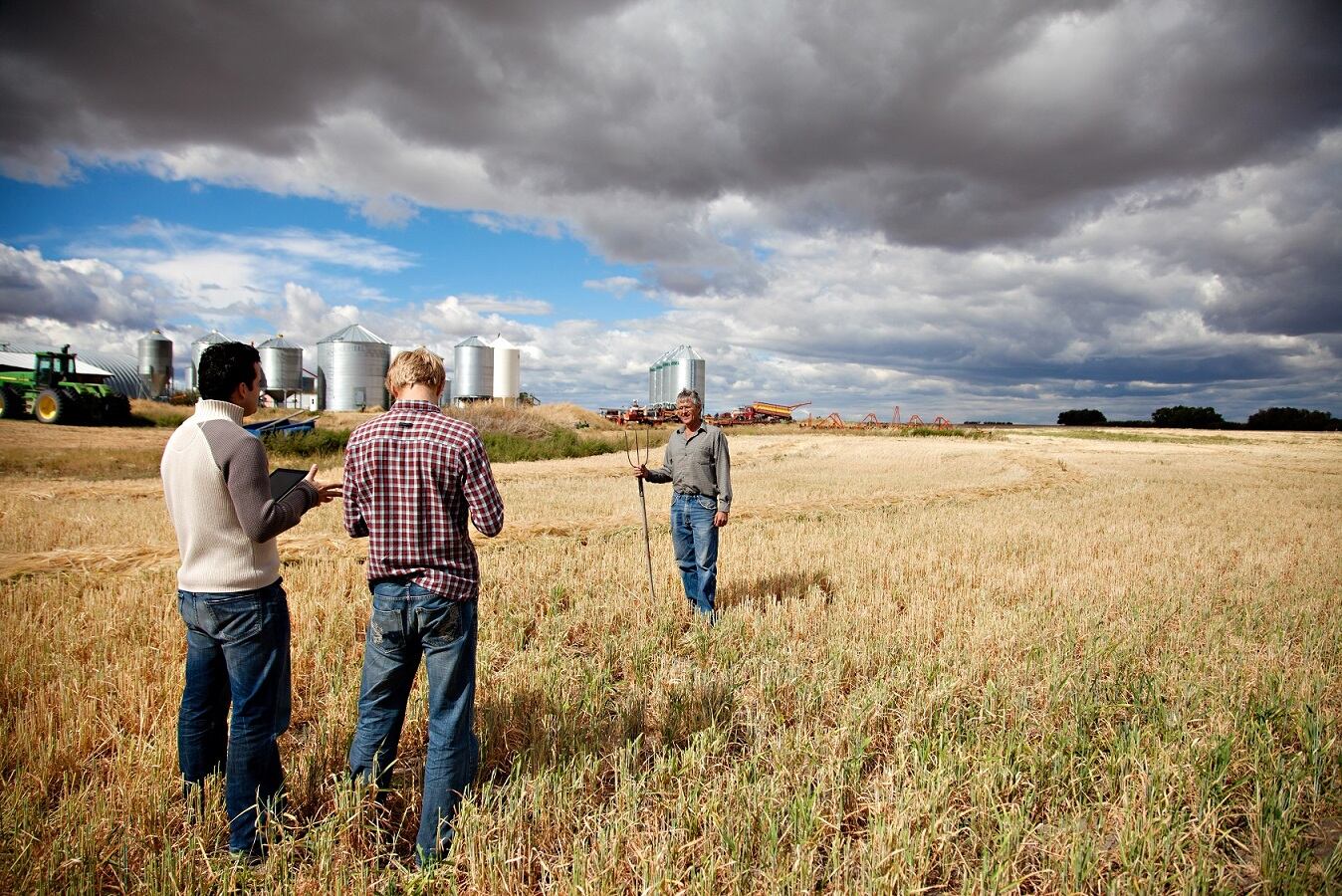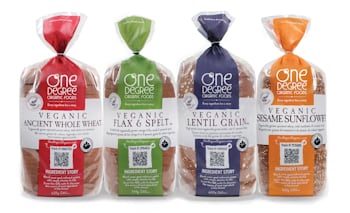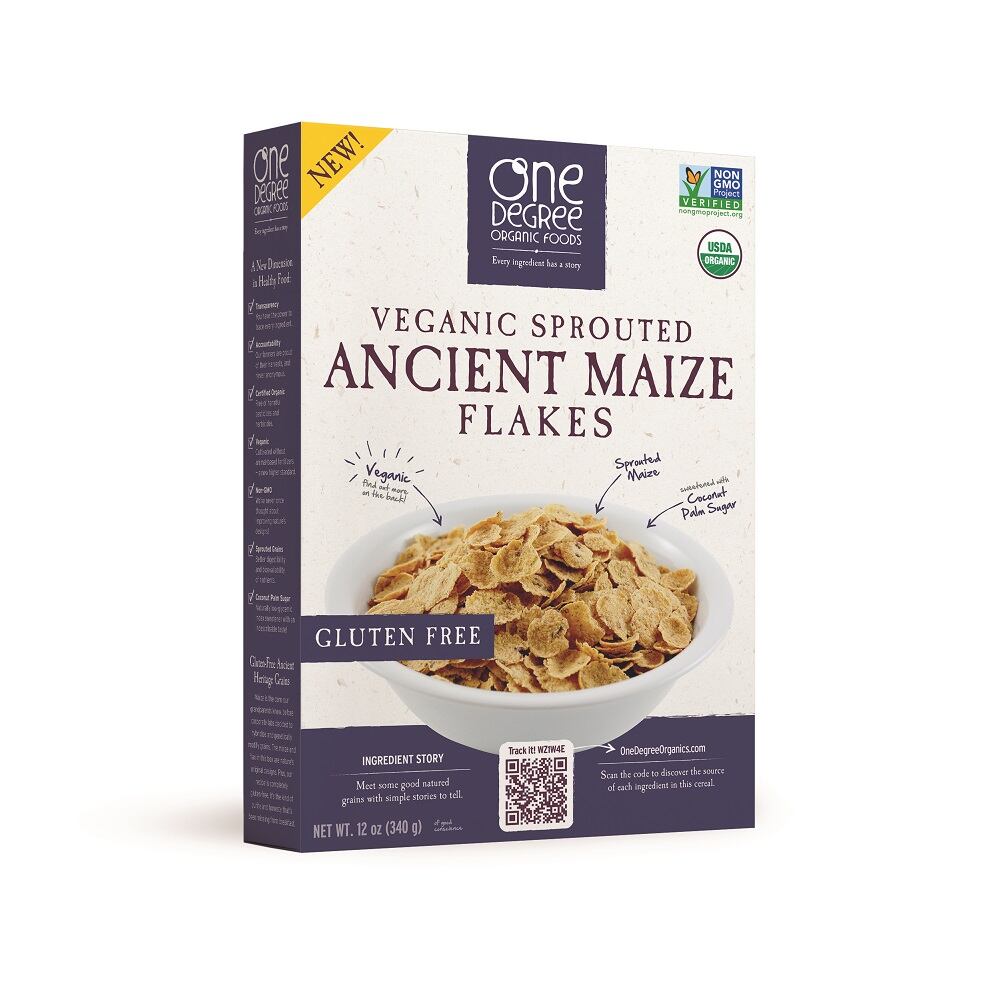“We wanted to create a farmers’ market feel in a CPG,” One Degree's founding partner and vice president of sales and marketing, Danny Houghton, told FoodNavigator-USA. “The reason behind our name is this idea that there’s only one degree of separation between the farmer and the customer. You’re never more than one degree away from your food.”
Houghton’s father-in-law, who also owns Canada’s largest sprouted grain bakery, came up with the idea for a food company based solely on local, traceable food after he discovered the bakery’s organic applesauce was coming all the way from Chile (instead of neighboring Washington State).
“Living just across from the state of Washington, he thought, ‘we can do better than this!’ So he came to me and said, ‘I want to create a company where every ingredient is 100% traceable for the consumer,” Houghton said.
Houghton used his communications and software development background to build a custom software platform for documenting ingredients and profiling farmers. It took the better part of year to build and debug the software and another six more months to do the legwork on the media program before the Abbotsford, BC-based company launched in March 2012 at Expo West.
Tremendous time, cost investment to achieve full transparency
One Degree’s products span sprouted and ancient grain cereals, sprouted grain and seed breads, sprouted whole wheat and seed flours and whole seeds. Each package contains a QR code, which enables smartphone-wielding consumers to pull up full product profiles, which list each ingredient, the name of farmer who grew it and the location of the farm, as well as photo essays and video interviews with farmers. While the majority of growers are in North America, some ingredients are sourced elsewhere, including Germany and Indonesia. But that doesn’t exclude them from documentation.
“We literally visit every organic farmer and do a full-blown media workup on them, which means we have to employ a full-time TV producer, photographer and writer who are deployed to each farm we do business with,” Houghton said.
Given the extensive work required on the back end, One Degree aims for a clean ingredient deck that’s largely focused on whole foods. (The exception is the sprouted grain bread, which uses slightly refined organic gluten.)

“We only want to tell stories about ingredients we’re proud to tell stories about,” Houghton said, adding that that’s largely why the company negotiates contracts directly and conducts its own onsite inspections. “It’s an additional cost for our business plan, but dealing directly with the farmers allows us to make sure that the ingredients are grown properly,” he added.
One Degree sources ingredients that are veganically grown, which means crops are cultivated with minimal harm to animals (i.e., no animal byproducts). The impetus for this was the 2012 arsenic scare with organic brown rice syrup, which Houghton largely attributes to antibiotics and hormones in feed.
“If you look at the various types of animal byproducts, many are heavily laced with antibiotics and hormones—with arsenic in manure being a top offender,” he said. “Veganic is only possible for us to do because we are transparent and know who the farmers are that we work with. Anybody who buys commoditized grains don’t know where they’re coming from and where they’re grown.”
We've planned for significant growth since the beginning
Despite the high cost of doing business, two-year-old One Degree is already profitable, with 2014 first-quarter sales up 400% over last year. Since the start, the company has never shied away from rapid growth, Houghton said.
“Our plan is to grow very rapidly while what we have is unique,” he said. “Transparency is a big enough trend that others will figure out how to replicate what we’re doing. So we’ve planned for significant growth since the beginning and have been able to scale accordingly.”

Indeed, within six months of launching, the company secured national distribution throughout the US and Canada through Unified Natural Foods. Now Whole Foods carries almost all of its products nationally, and One Degree is sold in several mid-level, regional natural food chains. The company also found a strong champion on the conventional side early on, in Northeastern US-headquartered Ahold USA (Stop & Shop, Giant Landover, Giant Carlisle). While One Degree is still mostly focused on solidifying the natural channel, it’s closely eyeing mass market growth.
Houghton's well aware of the price sensitivity that tends to separate the natural foods shopper from the conventional channel one, but the product is priced in line with or slightly above other certified organic, non-GMO products on the market and One Degree has been pleased with consumers' response.
“You have to look at what the market is doing, who you’re targeting and what kind of resources they have. It’s not a very low-cost type of product. But we’ve established aggressive price points and are building our margins to maintain transparency,” he said, adding: “we worked very hard to make sure anyone who wants to buy our product is able to do so.”
Non-GMO core to healthy products, but don't underestimate the value of certified organic
The company supports the non-GMO movement and most of its products are Non-GMO Project certified. But Houghton said that while non-GMO is a “core component” of any healthful product, the value of the organic badge can’t be underestimated.
“I think that while the non-GMO push is vital and we need to make sure people are educated to demand what’s in their food, but they also need to know that farmers can still spray non-GMO seeds with Roundup or other poisons, pesticides or sprays. We need to grow food in a way that is compatible with Mother Nature’s rhythms.

“That’s what we like so much about veganic farmers; they are soil scientists,” he added. They aren’t taking the latest drug order from Monsanto, rather they use time-honored methods like cover crops and crop rotation, as well as green manure to fix nutrients. They use those ways of respecting Mother Nature and pulling out nutrition that will make it a healthy food without bankrupting the soil,” he added.
As organic products continue to infiltrate the mainstream market, with more options available to supermarket, club chain and mass merchant shoppers alike, Houghton says it’s an indicator more consumers are embracing organic, which will ultimately drive prices down.
“As more consumer vote organic with their dollars, more of the market will see the wisdom of growing organic to meet that demand,” he said, adding that Wild Oats' securing distribution at Walmart (and at 25% lower prices than rival organic products) offers a compelling real-world example. But he admit's that there's a long way to go.
“Can I solve the world’s hunger problems with an organic diet? I don’t know. All I can do is focus on our sphere of influences and use the resources we have to support the types of crops we want to use, and encourage others do the same.”
